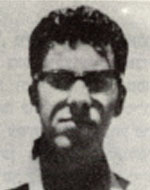Rosenthal, Gideon
Gideon, son of Leah and Hanan, was born on July 4, 1950 in Tel Aviv, where he studied at the AD Gordon Elementary School and later continued his studies at the “New High School” in Tel Aviv. Gidi, as his family and friends called him, began his career as a regular Tel Aviv boy. He grew up orphaned from a father, after his father died ten days after his birth, and his mother did not marry again. His childhood passed without many shocks and without special grades. From an early age, he was very interested in art. He read a lot, especially books of poetry and plays. Later he himself began to ‘sin’ in writing. At first, these were not just ordinary adolescent sins, but over time, after not abandoning these activities, his friends began to notice the high quality of the songs he had written and those who predicted a future in the arts. At the same time, Gidi was far from the image of a bookworm whose head was in the clouds. From the age of ten he was an active member of the Hashomer Hatzair movement and spent many hours of his free time active in the nest. He organized activities, planned and wrote training programs and participated in all the celebrations. Gidon joined the IDF in late September 1968 and was assigned to the paratroop brigade, where he was assigned to the Lachish district. After a relatively short period of time, he was appointed as a movement counselor. About two months before his regular service, he was transferred to the Armored Corps. As part of this conversion, he underwent a basic course in the Armored Corps and was trained as a tank gunner. After his discharge, he enrolled at Tel Aviv University, in the theater department, and began to realize his many talents. At that time his personality began to crystallize politically. He began to express himself strongly against the war and joined the activities of the leftist movements, such as Tchelet Adom and Moked. He began playing, reading and even writing himself. He mainly translated poetry and wrote poetry. Until about a year before his fall, he was a member of Kibbutz Beit-Kama. In the kibbutz he worked in the dairy industry and at the same time engaged in extensive cultural activities. During the Yom Kippur War, Gidi participated in the battles in the Golan Heights and in the battles to break into the Syrian enclave. On October 11, 1973, when his unit attacked the Syrian village of Khan-Arnabeh, his tank was hit and he was forced to abandon it. On his way back to our forces, he encountered an ambush of Syrian soldiers and was killed in the exchange of fire. He was brought to eternal rest in the cemetery in Kiryat Shaul. He was survived by his mother, sister and brother. After his fall, he was promoted to corporal. The theater department at Tel Aviv University has produced in his memory a play called “Death at the ends of my thoughts nesting”; After his death he was published and sold in several editions of the book “Ha Barbara, What a Prostitution of War”, in which his own translations of the poems of Jacques Preve, the Beatles, Bertold Brecht and others as well as poems he wrote; In addition, his song “Love has many faces” appeared in Arik Einstein’s album, which bears the title of the song.
